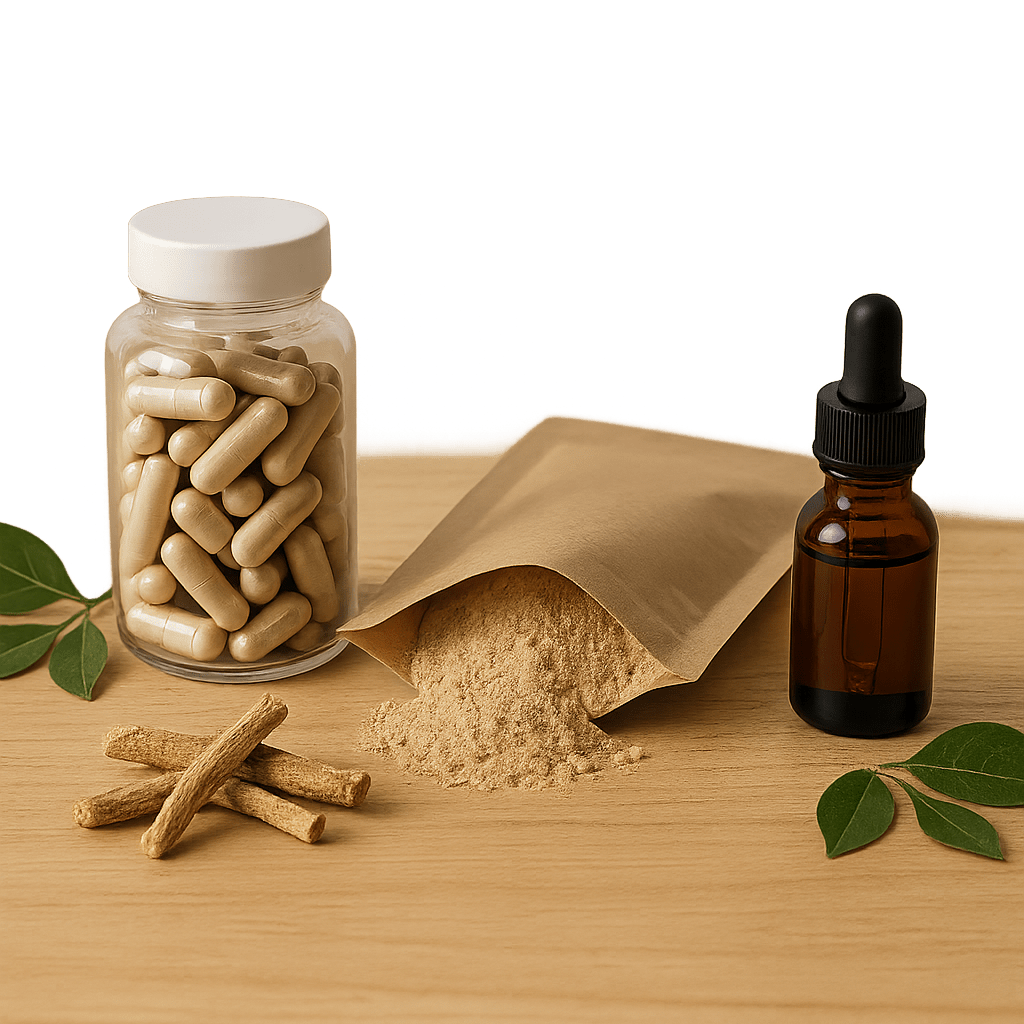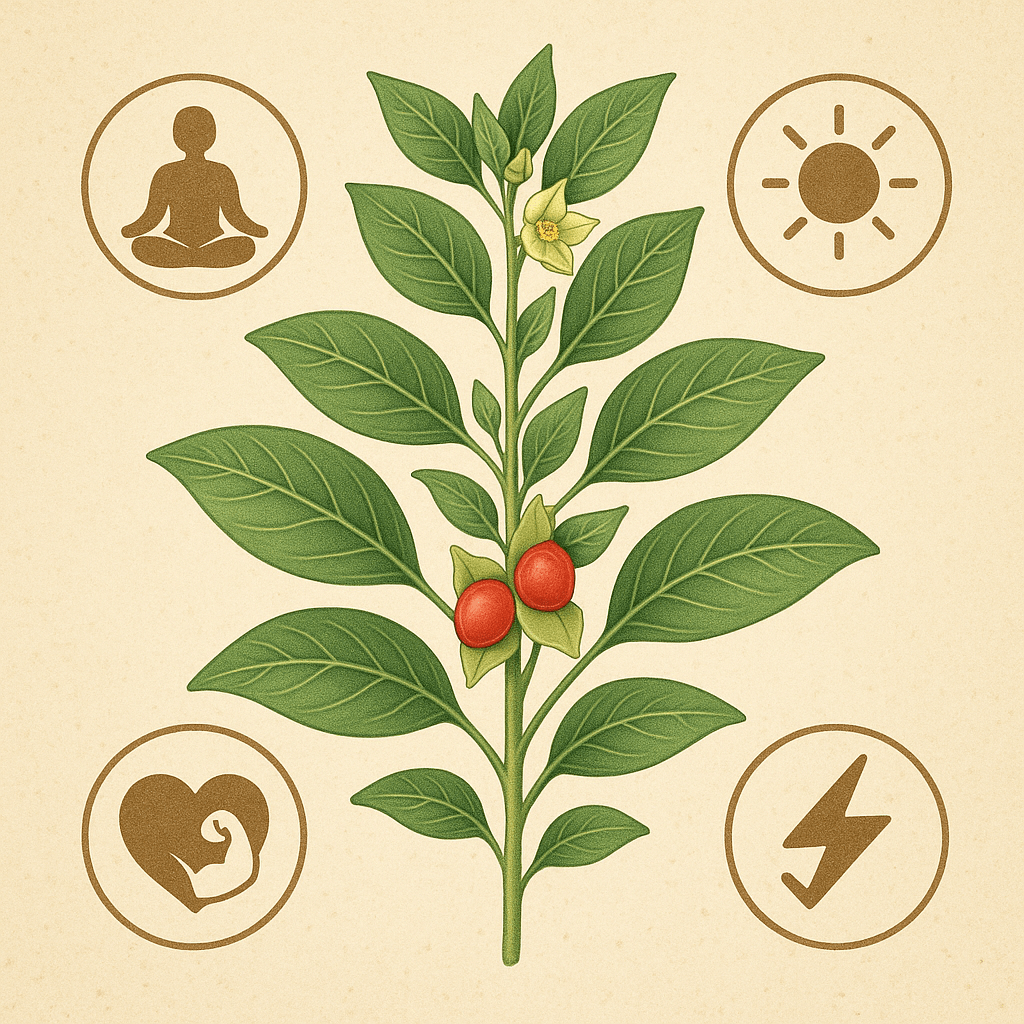Ashwagandha (Withania somnifera), one of the most important adaptogenic herbs in Ayurvedic medicine, is now increasingly recognized as a natural remedy in Lithuania. This traditional herb, also known as “Indian ginseng”, has been used in Indian folk medicine for centuries, and now scientists are revealing its benefits for modern man. Vitamins for the nervous system, combined with natural adaptogens such as ashwagandha, are becoming an increasingly popular choice among Lithuanians looking for natural ways to improve their well-being.
In this comprehensive guide, you will learn how ashwagandha affects the body, what scientific benefits it provides, what possible side effects you may encounter, and how to use this herb properly and safely. Whether you have already tried this adaptogen or are just considering incorporating it into your health routine, here you will find all the information you need to make an informed decision.
What is ashwagandha? Composition and Mechanism of Action
Ashwagandha (Withania somnifera) is a perennial shrub belonging to the potato family, native to India, North Africa and the Middle East. Botanically, this plant is distinguished by its erect, branched roots, which are its most valuable part.

Sometimes called sleeping withania in Lithuanian, ashwagandha is known worldwide for its adaptogenic properties – its ability to help the body adapt to stress and restore balance.
The active ingredients of this plant are:
- withanolides – the main biologically active substances responsible for many therapeutic effects;
- alkaloids – choline, tropine and other substances involved in the functioning of the nervous system;
- flavonoids – with antioxidant properties;
- saponins – contributing to the immune-regulating effect;
- steroidal lactones – important for adaptogenic action.
The main principle of action of ashwagandha is based on its ability to regulate the body’s adaptive systems. Scientific research shows that this plant stabilizes the hypothalamic-pituitary-adrenal (HPA) axis – the system responsible for the secretion of stress hormones. It is for this reason that ashwagandha reduces the amount of cortisol (the main stress hormone), helping the body better manage stress.
Ashwagandha also has the following effects:
- protection of nerve cells from oxidative stress;
- anti-inflammatory effects;
- immunomodulatory effects, regulating immune responses;
- modulation of GABA receptor activity (a calming neurotransmitter);
- antioxidant effects, protecting cells from free radical damage.
In the Ayurvedic tradition, ashwagandha has been used for thousands of years as a “rasayana” – a plant that restores vital energy and promotes longevity. Modern scientific terminology classifies this plant as an adaptogen – a natural substance that helps the body adapt to stressors and restore biochemical balance. In this way, the use of ashwagandha continues a long line of tradition, but is now supported by modern scientific research.
Key benefits of Ashwagandha (based on traditional Ayurvedic use)
Helps maintain emotional balance and resilience to stress
Ashwagandha is a traditional adaptogenic herb that helps the body adapt to daily stress and maintain emotional balance. It is often used in the search for a natural solution for peace and stress management.
Helps maintain overall balance and vitality
In Ayurveda, Ashwagandha is valued for its ability to help maintain physical and emotional balance, promote the body’s resistance to external factors, and maintain a sense of vitality in daily activities.
Used in traditional Ayurvedic medicine to maintain stamina and energy
For thousands of years, Ashwagandha has been used in traditional Indian Ayurvedic practice to maintain stamina, physical energy, and performance – especially for those who feel tired or exhausted from prolonged exertion.
Helps maintain mental alertness and alertness
Ashwagandha is often associated with the ability to maintain mental clarity, concentration, and alertness. It has been traditionally used to support attention and cognitive function in daily activities.
Used in traditional medicine to promote rest and relaxation
Ashwagandha is valued in traditional medicine for its calming properties, often used to promote relaxation, emotional relaxation, and evening calm after a stressful day.
Usage and Dosage: How to Choose, How Much and When to Take?
To get the most out of ashwagandha, it is important to know how to use and dose it properly. In this section, we will discuss the different product forms, recommended doses and usage characteristics.
Ashwagandha Product Forms
Various forms of ashwagandha can be found on the Lithuanian market, each with its own benefits:

- Capsules: The most convenient and popular form. Standard capsules usually come in 300-500 mg strengths. KSM-66 extract is often used, one of the highest quality standardized extracts.
- Powder: Traditional form, allowing for more flexibility in dosing. Can be mixed with water, milk, or added to smoothies.
- Tinctures: Liquid concentrate, quickly absorbed by the body. Convenient for those who have difficulty swallowing capsules.
- Tea: The gentlest way to consume ashwagandha, but not the most effective due to the lower concentration of active ingredients.
- Gummies: A newer, tasty option, especially suitable for those who feel uncomfortable taking traditional forms of dietary supplements.
Recommended Dosages and Administration
Optimal doses of ashwagandha depend on several factors, including the purpose of use, the form of the product, and the individual body’s response:
- Standard Daily Dose: For most adults, 250 mg to 1000 mg per day is recommended.
- Starting Dose: It is recommended to start with a lower dose (about 250-300 mg) and monitor the body’s response.
- Frequency of Dosing: It is usually recommended to divide the dose into 2 times a day (morning and evening).
- Duration of Use: Optimal results are usually observed after 8-12 weeks of continuous use. After 2-3 months, it is recommended to take a 2-4 week break.
When is the best time to take Ashwagandha?
- Morning intake: If you are taking Ashwagandha to increase energy and improve concentration, it is best to take it in the morning after breakfast.
- Evening intake: To improve sleep quality and reduce anxiety levels, it is best to take it 1-2 hours before bed.
- Taking with food: It is recommended to take it with food to reduce the risk of possible stomach irritation.
How to choose a quality product?
With products from various manufacturers on the market, it is important to be able to recognize a quality Ashwagandha supplement:
- Standardized extract: Look for products with a standardized extract, especially KSM-66 or Sensoril, which are the most researched and reliable.
- Withanolide content: Quality products indicate the percentage of withanolides (active components) – at least 1-5% is recommended.
- Absence of additional additives: Avoid products with a large amount of fillers, dyes or preservatives.
- Third-party testing: Products that have been independently tested for purity and active ingredient content are generally more reliable.
- Organic certification: When possible, choose organically grown ashwagandha that is free of pesticides and heavy metals.
Ashwagandha can be effectively combined with other natural supplements designed to improve brain function. If you are wondering which supplements are best for supporting cognitive function, it is worth looking into vitamins for brain function that can complement the benefits of ashwagandha.
It is important to remember that it is always recommended to consult a healthcare professional before taking any supplement, including ashwagandha, especially if you are taking any medications or have a medical condition.
Side Effects and Precautions
While ashwagandha is considered a relatively safe adaptogen for most adults, it is important to be aware of the potential side effects and situations where you should be cautious. This will help ensure the safe and effective use of this herb.
Most Common Side Effects
When taken at recommended doses, side effects are usually mild and temporary. The most common include:
- Indigestion: Some people may experience mild nausea, stomach pain, or diarrhea, especially when taking ashwagandha on an empty stomach.
- Drowsiness: Due to its sedative effects, some people may experience increased drowsiness, especially when starting to take it or when taking higher doses.
- Headache: Headaches have been reported in rare cases, and usually resolve on their own.
- Dry mouth: One of the less common but possible side effects.
- Allergic reactions: As with any plant, allergic reactions may occur, including skin rash or itching.
Who should be especially careful
Certain groups of people should be especially careful or avoid using ashwagandha without medical supervision:
- Pregnant and breastfeeding women: There is a lack of reliable research on the safety of ashwagandha in these groups, so it is recommended to refrain from using it.
- People with autoimmune diseases: Due to its immunomodulatory effects, ashwagandha may worsen symptoms of diseases such as rheumatoid arthritis, lupus, or Hashimoto’s thyroiditis.
- People with thyroid disorders: Ashwagandha may increase thyroid hormone levels, so caution should be exercised in people taking thyroid medication.
- People with diabetes: Since ashwagandha may lower blood sugar, people with diabetes should monitor their glucose levels closely.
- People with low blood pressure: Ashwagandha may further lower blood pressure.
- Before surgery: It is recommended to discontinue use at least 2 weeks before elective surgery due to possible effects on the action of sedatives.
Drug Interactions
Ashwagandha may interact with some medications, so it is important to inform your doctor about all medications you are taking:
- Sedatives and hypnotics: May enhance their effects.
- Immunosuppressants: May reduce the effectiveness of these medications due to their immunomodulatory properties.
- Antidiabetic medications: May enhance their glucose-lowering effects.
- Thyroid medications: Dose adjustment may be necessary.
- Blood pressure medications: May enhance their effects.
- Corticosteroids: Theoretically, may reduce their effects.
Long-term safety
While short-term use of ashwagandha (up to 3 months) is considered safe for most adults, the safety of long-term use is not as well studied. It is recommended to take periodic breaks (2-4 weeks after 2-3 months of use) and regularly consult a healthcare professional.
If ashwagandha does not work for you or you notice any unpleasant symptoms, it is worth considering alternative dietary supplements. Energy supplements may be a good option for those looking to boost their energy levels naturally but are unable to take ashwagandha.
Always remember that any supplement, including ashwagandha, is not a medicine and should not be used to treat any medical condition without the supervision of a healthcare professional. Always consult your doctor before taking ashwagandha or changing your dosage, especially if you have a chronic medical condition or are taking prescription medications.
Frequently Asked Questions About Ashwagandha
How quickly does Ashwagandha start to work?
Most users notice positive effects after 2-6 weeks of daily, consistent use. Results may vary depending on individual health, product type, and dosage. Some people experience mild sedation after just a few days, but optimal results are usually seen after 8-12 weeks.
Is it safe to take Ashwagandha long-term or should I take a break?
Studies show that a 2-3 month period of daily use is safe for most adults. After this period, a 2-4 week break is recommended to avoid possible body habituation and ensure long-term effectiveness. It is advisable to consult a healthcare professional for individual recommendations.
Can Ashwagandha be combined with other energy or cognitive supplements?
Yes, ashwagandha can be combined with many other supplements, but it is always advisable to consult a doctor, especially if combining multiple adaptogens or cognitive/energy support supplements. You can find more information about suitable combinations in the cognitive function supplements section.
Is ashwagandha suitable for vegetarians and vegans?
Most ashwagandha supplements are plant-based, so they are suitable for vegetarians and vegans. However, you should always check the composition of the capsules, as some manufacturers may use animal-derived gelatin in the capsules. Look for products that are labeled “vegan-friendly” or capsules made from cellulose or other plant-based materials.
Who should avoid taking ashwagandha?
Pregnant or breastfeeding women, children, and those with autoimmune diseases, thyroid disorders, or those taking certain medications (e.g., immunosuppressants, thyroid medications) should avoid ashwagandha. Also, individuals preparing for surgery (use should be discontinued at least 2 weeks beforehand), and those who are allergic to plants in the potato family.

